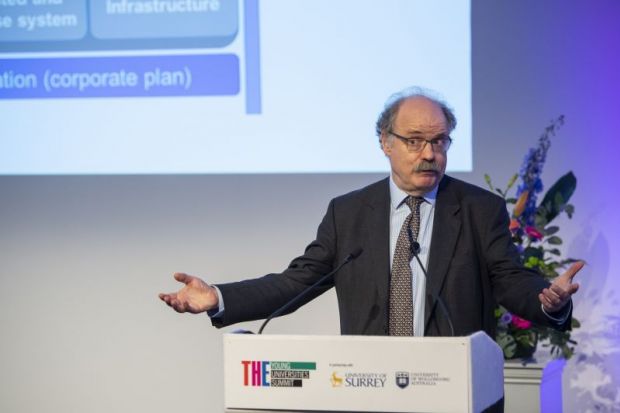UK academics should stop disputing government decisions over research funding and focus their efforts on fighting threats to core academic values, Sir Mark Walport said.
The chief executive of UK Research and Innovation, the umbrella body for the country’s funding councils, told the Times Higher Education Young Universities Summit that ongoing debates about the “right” amount of political control over research funding reflected a “false dichotomy”.
“There’s historically been some conflict: should the questions be asked top-down, or should academics be left alone to ask the questions. I don’t think we should get into too much of a fury about top-down versus bottom-up,” he said.
The reason for this, Sir Mark said, was that the definitions were “not as distinct as people say and…the truth is you need both”.
Sir Mark’s comments, delivered at the University of Surrey, came after academics raised concerns that the amount of money being allocated for basic research was dwindling in favour of funding for applied research tied to specific, politically strategic goals.
Researchers had to consider “what is it that we as taxpayers want from the money that has been confiscated to pay for information”, Sir Mark argued. “Of course most research has its value when it is applied in some way. And again, we shouldn’t get worked up about this…From my perspective it’s about funding taxpayers’ questions in whatever geometry is most likely to deliver results.”
Sir Mark suggested that universities should focus on tackling broader societal issues.
“We see the rise in populism…which is a challenge to the values of Enlightenment and a questioning of truth,” he said. “If there is one area in which universities have an absolutely vital role in working individually and collectively, it is actually on pegging those values – the importance of freedom of speech, of debate,” he urged.
The split in public attitudes towards expertise laid bare by the Brexit vote, along with an increased focus on equality and inclusion, presented opportunities for young universities in particular, Sir Mark said, because they “don’t have the burden of seven centuries of layers of more and more governance”, and therefore had the “advantage of potential agility” in how they chose to address such issues.
“We have to be able to look through the eyes of animosity, we have to look through the eyes of people who are voting in different ways to us…I think that is something which is extremely important for universities to take very seriously,” Sir Mark said.
On Brexit, Sir Mark acknowledged sector concerns about the loss of talent and funding as a result of the uncertainty, telling attendees that “from a UK perspective we will only do the best we can”. He cautioned that, while it was crucial for the UK to maintain its network of international partners, “you can bring horses to water but not necessarily make them drink”.
Speaking afterwards, Sir Mark rejected suggestions that UKRI lacked a long-term plan for British science – a criticism fuelled by a spate of senior-level departures from the umbrella body this year.
Referring to a recent policy paper outlining the breakdown of its spending, he said: “Obviously it will depend on the outcome of future spending reviews but we’ve been very clear we have a very clear long-term plan.”
rachael.pells@timeshighereducation.com
后记
Print headline: ‘Fury’ over cash strings a distraction




